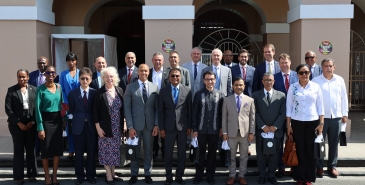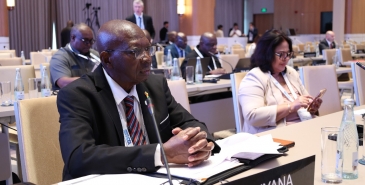Evidence (Amendment) Bill 2013 – Bill No. 23/2013
Speech delivered at: 67th Sitting - Tenth Parliament - 16 January, 2014
16 January, 2014
5402
Mr. B. Williams: Thank you Mr. Speaker, if it pleases you. The Bill before this Hon. House is one that will be welcomed by practitioners of the criminal law. In fact, it is long overdue. I think basically it is deciding to speed up trials in conformity with Article 144, which guarantees every citizen, charged with an offence, a speedy trial.
What existed before was that there were only two categories and largely that was related to the medical practitioner, the post mortem and the medical report which had to be dealt with within 48 hours. Mr. Speaker, you would be well aware of that. The importance of that was that those certificates, once they were signed by the analyst who has to be gazetted, meant that they could have been prima facie admissible. In other words, if there were no objections, they could have been tendered in evidence and utilised by the attorneys. It did not prevent a request being made for the practitioner himself/herself to attend to the court and give viva voce evidence.
These new categories, in fact, delayed trails because there are many instances where for example, what would have been termed a ballistic expert dealing with ammunition and firearms, could not tender his/her examination because they did not fall within the category –within section 43. So he/she would have had to give their evidence live and could not just tender their examination like that because it would offend the rule against narrative.
We welcome it and what I have noticed is that in these new categories there are no police forensic labs. It seems to be now a composite lab. So the police expert or analyst, I supposed, would be subsumed within this composite body that is now the scientific. In fact, they would be designated scientific officers.
It is important and I would have to see fingerprints. I do not know if this is a lost art, but if anyone can indicate to me a case that has been successfully proven based on an analyst’s fingerprint evidence, I would be happy, but we welcome those categories.
I noticed that in Clause B(5) they have cut out the Rules Committee of the High Court and purports to repose the power solely in the Minister. I do not know if that Minister would be the Minister of Legal Affairs or the Minister of Home Affairs, but it appears that the original framers of the Evidence Act thought it wise to include the Rules Committee, authorised under the High Court Act, to have a role in determining the quality of evidence that should reach the court. Perhaps the Attorney General would indicate to us why they have sought to remove the Rules Committee of the High Court and repose that power only in the Minister.
The importance of speedy trails cannot be gainsaid. In fact, the Government has passed several pieces of legislation, designed to effect speedy trials. One such was one that dealt with Committal Proceedings, so as to reduce the time that one would have to spend before the court, before one’s matter is finally determined. The Criminal Law Procedure (Amendment) Act of 2008, perhaps the Attorney General could tell us how effective the implementation of that Act has been on the court systems to speed up trials.
We have found that committal proceedings, if a particular magistrate agrees to proceed in that manner, could take as long as it originally took when there was no paper committal legislation. Perhaps it would be a good thing for a survey to be done by the Hon. Attorney General to determine whether all magistrates are required to implement paper committals and the paper committal legislation. How many cases have been dealt with so far, since 2008 because I can assure the House that we have not seen much progress in that area?
Again, the quality of our justice system –criminal system to speed up trials; jury trials are still taking a long time despite the Committal Proceeding legislation. People are still there waiting for years before they can come to trial before the jury system.
As I am on that point, I have been hearing noises about doing away with the jury system, but that would be a great catastrophe for a country at this level of its development because like the ombudsman, the jury system which has been hallowed by time is one of the sitting elves that we have, perhaps the soul, to protect an accused person against the atrocities of the State, so that a person who is maliciously charged and is before the court, should thank his lucky stars that we have a jury system so prima facie. The system in its design, some improvement could be done to it, but surely it is a good system but it has to be made efficacious. Efforts must be made to ensure that there are no leakages from the system and that people have a trial by 12 persons of their peers so that at the end of the day we can rest assured that justice was done in the matter. In that instance, we are still not on board with the ability of the Director of Public Prosecutions (DPP) to appeal a not guilty decision of a jury.
All of those elements – I trust that the Hon. Attorney General, with the design to speed up trials would address his mind too. He should not forget the continuous training of magistrates would be very important – and judges. We have programmes that are training the judges, but we need to also train the magistrates, especially if we are talking about the doing away with jury trials. When one sees what is happening at this stage it is important that we have continuous training for our officers – legal and judicial officers in the court.
In this context the A Partnership for National Unity (APNU) has no problem with supporting this Evidence Amendment Bill, as it is. Thank you, Mr. Speaker. [Applause]
Speech delivered by:
What's New

16 April, 2025
Speaker of the National Assembly Hosts Luncheon and Tour of Public Buildings for Diplomats

08 April, 2025
Minister Kwame McCoy promotes Low Carbon Development Strategy in IPU Committee Meeting on Sustainable Development

07 April, 2025
Speaker Nadir Emphasises Guyana’s Commitment to Social Development at IPU General Debate

07 April, 2025
Clerk of the National Assembly Attends ASGP Plenary Meetings during the 150th IPU Assembly in Tashkent, Uzbekistan

